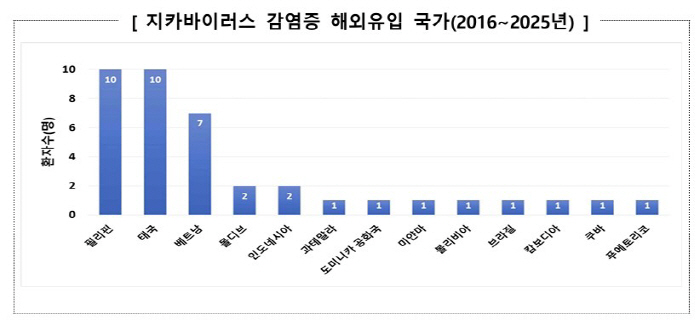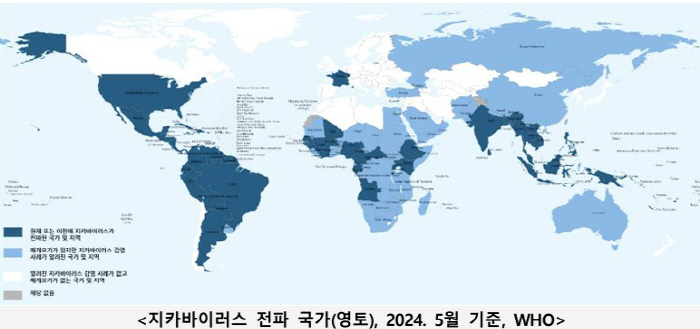Before the full-fledged holiday season, the first Zika virus patient in two years...Confirmed after visiting Indonesia
Jun 04, 2025
A Zika virus infection patient occurred for the first time in two years ahead of the full-fledged holiday season.
The Korea Centers for Disease Control and Prevention recently urged caution when visiting 92 countries in the Americas, Southeast Asia, the Western Pacific, Africa, and Europe as confirmed cases of Zika virus infection occurred after a visit to Indonesia.
Zika virus infection is transmitted by being bitten by forest mosquitoes infected with Zika virus, a type of flavivirus, and symptoms such as spot-cystic rash, fever, conjunctival congestion, joint pain, and muscle pain appear after an incubation period of 3 to 14 days. In addition to mosquito bites, cases of transmission through sexual contact, transfusion of infected blood materials, vertical mother-to-mother infections, and laboratory exposure have also been reported, and infections during pregnancy can lead to premature birth, fetal death and stillbirth, microcephaly, and birth defects.
Globally, there were 56,601 Zika virus infections in 2023, 44,957 in 2024, and 12,660 in May 2025.
According to the state of occurrence from 2023 to May 2025, it occurs frequently in Brazil (108,897), Bolivia (1496), and Argentina (1252) in Latin America, Thailand (1106), India (151), and Singapore (47) in Asia, and Burkina Faso (1 person) in Africa.
The first Zika virus infection patient reported this year was a man in his 40s who was infected after visiting Bali, Indonesia, had mosquito bites there, and visited a medical institution on the third day after returning home with symptoms such as chills, papular rash, conjunctival congestion, and muscle pain, and laboratory tests confirmed positive.
A total of 40 patients with Zika virus infection in Korea have been reported since 2016, of which 39 were caused by overseas inflows, excluding one laboratory infection in 2020. The estimated infected countries were 10 in the Philippines and Thailand, 7 in Vietnam, 2 in the Maldives, and 2 in Indonesia, respectively, with the highest number of patients coming from the Philippines and Thailand.
The Korea Centers for Disease Control and Prevention emphasized avoiding sexual contact, such as delaying pregnancy and using condoms, and familiarizing yourself with prevention rules for three months after traveling to countries where Zika virus infections occurred.
First of all, you should be familiar with mosquito prevention methods and prepare mosquito repellent supplies and emergency medicines. In addition, avoid 'full forest' and 'in the mountains' where there are a lot of mosquitoes at the destination as much as possible and wear a long-sleeved top and long pants when going out. In particular, mosquitoes are attracted to dark colors, so it is recommended to wear bright colors during activities. It is also recommended to live in accommodations with insect screens or mosquito nets and good air conditioning.
If suspicious symptoms such as rash, fever, conjunctivitis, joint pain, muscle pain, and headache occur within two weeks of returning home, you should visit a nearby medical institution to inform them of your overseas visit history and receive prompt diagnosis and treatment. In addition, blood donation should be avoided during the four-week period of blood donation suspension.
The Korea Centers for Disease Control and Prevention recently urged caution when visiting 92 countries in the Americas, Southeast Asia, the Western Pacific, Africa, and Europe as confirmed cases of Zika virus infection occurred after a visit to Indonesia.
Zika virus infection is transmitted by being bitten by forest mosquitoes infected with Zika virus, a type of flavivirus, and symptoms such as spot-cystic rash, fever, conjunctival congestion, joint pain, and muscle pain appear after an incubation period of 3 to 14 days. In addition to mosquito bites, cases of transmission through sexual contact, transfusion of infected blood materials, vertical mother-to-mother infections, and laboratory exposure have also been reported, and infections during pregnancy can lead to premature birth, fetal death and stillbirth, microcephaly, and birth defects.
|
|
According to the state of occurrence from 2023 to May 2025, it occurs frequently in Brazil (108,897), Bolivia (1496), and Argentina (1252) in Latin America, Thailand (1106), India (151), and Singapore (47) in Asia, and Burkina Faso (1 person) in Africa.
The first Zika virus infection patient reported this year was a man in his 40s who was infected after visiting Bali, Indonesia, had mosquito bites there, and visited a medical institution on the third day after returning home with symptoms such as chills, papular rash, conjunctival congestion, and muscle pain, and laboratory tests confirmed positive.
A total of 40 patients with Zika virus infection in Korea have been reported since 2016, of which 39 were caused by overseas inflows, excluding one laboratory infection in 2020. The estimated infected countries were 10 in the Philippines and Thailand, 7 in Vietnam, 2 in the Maldives, and 2 in Indonesia, respectively, with the highest number of patients coming from the Philippines and Thailand.
The Korea Centers for Disease Control and Prevention emphasized avoiding sexual contact, such as delaying pregnancy and using condoms, and familiarizing yourself with prevention rules for three months after traveling to countries where Zika virus infections occurred.
First of all, you should be familiar with mosquito prevention methods and prepare mosquito repellent supplies and emergency medicines. In addition, avoid 'full forest' and 'in the mountains' where there are a lot of mosquitoes at the destination as much as possible and wear a long-sleeved top and long pants when going out. In particular, mosquitoes are attracted to dark colors, so it is recommended to wear bright colors during activities. It is also recommended to live in accommodations with insect screens or mosquito nets and good air conditioning.
If suspicious symptoms such as rash, fever, conjunctivitis, joint pain, muscle pain, and headache occur within two weeks of returning home, you should visit a nearby medical institution to inform them of your overseas visit history and receive prompt diagnosis and treatment. In addition, blood donation should be avoided during the four-week period of blood donation suspension.
This article was translated by Naver AI translator.















